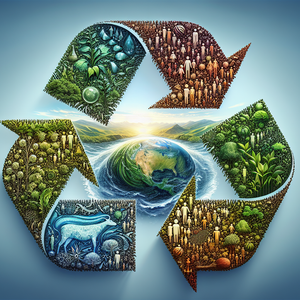The Science of Adaptation: How Fisheries Biologists Can Lead in Climate Change Advocacy and Conservation Policy

Fisheries biologists are equipped with a unique blend of skills that make them ideal candidates to take on roles in climate change advocacy and conservation policy. At the core of their work is a deep understanding of aquatic ecosystems, population dynamics, and the interplay between species and their environments. These competencies are directly transferable to addressing the complex and multifaceted challenges of climate change.
Data Analysis and Research Expertise
Fisheries biologists excel at collecting and analyzing data to understand changes in aquatic ecosystems. These skills are invaluable in climate advocacy, as data-driven evidence is crucial for making a compelling case. For example, fisheries biologists can track the impact of rising ocean temperatures on fish populations, measure carbon sequestration in marine habitats, or analyze the effects of ocean acidification on biodiversity. This evidence can then be used to inform policy decisions and advocate for stronger climate action.
Communication and Collaboration
Another advantage fisheries biologists bring to the table is their ability to communicate complex scientific findings to diverse audiences. Whether presenting research to policymakers, engaging with local fishing communities, or collaborating with interdisciplinary teams, fisheries biologists are adept at translating science into actionable insights. This skill is essential in climate advocacy, where building consensus and inspiring action often depend on effective communication.
Multidisciplinary Problem-Solving
Fisheries biologists frequently work with professionals from various fields, including hydrology, ecology, and data science. This collaborative approach mirrors the interdisciplinary nature of climate change solutions, which require expertise from multiple sectors. By leveraging their experience in teamwork and problem-solving, fisheries biologists can contribute to innovative solutions that address the interconnected challenges of climate change.
Pathways into Climate Advocacy and Policy
For fisheries biologists looking to pivot their careers toward climate change advocacy or conservation policy, a wealth of opportunities exists. Below are several pathways they can pursue, each offering the chance to make a meaningful impact.
Joining Climate Advocacy Organizations
Nonprofits and advocacy groups focused on climate change are in constant need of experts who can bring scientific rigor to their campaigns. Fisheries biologists can contribute by developing evidence-based strategies, crafting accessible messaging, and lobbying for stronger environmental protections. Organizations like Greenpeace, Oceana, and the Environmental Defense Fund actively seek professionals with expertise in marine and aquatic systems. For instance, a fisheries biologist could work on campaigns to promote sustainable fishing practices or protect marine ecosystems from the impacts of climate change. By combining their scientific knowledge with a passion for environmental justice, they can play a pivotal role in driving public awareness and policy reform.
Shaping Conservation Policy
Government agencies, international organizations, and think tanks are increasingly prioritizing climate resilience and biodiversity conservation. Fisheries biologists can influence policy by advising on legislation, drafting conservation strategies, or implementing programs that protect aquatic habitats. For example, they could help design policies to safeguard coral reefs, reduce bycatch in commercial fisheries, or promote sustainable aquaculture practices. The skills fisheries biologists bring—such as ecosystem modeling and stakeholder engagement—are invaluable in crafting policies that balance environmental protection with economic sustainability.
Leading Nonprofit Organizations
Fisheries biologists with leadership aspirations can take on executive roles in environmental organizations, where they can shape the strategic direction of climate-focused initiatives. As program directors or CEOs, they can oversee projects that address climate impacts on marine ecosystems, advocate for biodiversity preservation, and promote community resilience. Leadership roles also offer the opportunity to mentor the next generation of environmental scientists and advocates, fostering a culture of collaboration and innovation in the fight against climate change.
Engaging in Community-Based Conservation
Local conservation efforts often rely on experts who can bridge the gap between science and community needs. Fisheries biologists can lead grassroots initiatives that empower coastal and fishing communities to adapt to climate impacts, such as shifting fish stocks or rising sea levels. These roles also provide an opportunity to advocate for equity and inclusion, ensuring that underrepresented communities have a voice in climate solutions. For instance, a fisheries biologist might work with local stakeholders to establish marine protected areas or develop sustainable fishing practices that support both livelihoods and ecosystems.
Real-World Success Stories
The potential for fisheries biologists to transition into climate advocacy and policy work is not hypothetical—it has already been demonstrated by leaders in the field. Consider the following examples: Jane Lubchenco, a marine ecologist and former administrator of NOAA (the National Oceanic and Atmospheric Administration), has been a trailblazer in advocating for sustainable ocean policies. Her work highlights how expertise in aquatic science can inform high-level decisions and drive meaningful change. Ayana Elizabeth Johnson, a marine biologist and founder of the Urban Ocean Lab, has focused her efforts on the intersection of ocean conservation and urban resilience. By combining scientific knowledge with community engagement, she has inspired innovative approaches to climate adaptation. These individuals demonstrate that fisheries biologists can make a profound impact by leveraging their skills and expertise in new ways. Their stories serve as a reminder that career transitions, while challenging, can lead to opportunities for greater influence and purpose.
Taking the First Steps
For fisheries biologists considering a transition into climate advocacy or policy, the journey begins with small but significant steps: Professional Development: Enroll in courses or workshops on environmental policy, public speaking, or nonprofit management to build new skills. Networking: Connect with professionals in the climate space through conferences, webinars, or organizations like the Society for Conservation Biology. Volunteering: Gain hands-on experience by volunteering with advocacy groups or local conservation projects. Storytelling: Use your research background to publish articles or op-eds that highlight the connections between aquatic science and climate resilience. By taking these steps, fisheries biologists can position themselves as leaders in the fight against climate change, ready to tackle one of the most urgent challenges of our time.
The climate crisis demands bold action and innovative solutions, and fisheries biologists are uniquely equipped to rise to the occasion. With their expertise in aquatic ecosystems, data analysis, and interdisciplinary collaboration, they have the tools to drive meaningful change in climate advocacy, conservation policy, and nonprofit leadership. Whether shaping global policy, leading community-based initiatives, or inspiring public action, fisheries biologists have the opportunity—and the responsibility—to make a lasting impact. For those who may have faced career disruptions, such as layoffs from roles like those at the U.S. Fish and Wildlife Service, this is a chance to pivot toward a new, impactful chapter. The world needs passionate, knowledgeable leaders to confront the challenges of climate change, and fisheries biologists are uniquely positioned to lead the way. In a time of rapid change, adaptation is not just a survival skill—it is a pathway to hope and leadership for a better future.
Marine Conservation Policy Advisor
Government agencies (e.g., NOAA, EPA), international organizations (e.g., United Nations), and policy think tanks
Responsibilities
Develop and advocate for policies that protect marine ecosystems, such as sustainable fisheries management or coastal habitat restoration.
Provide scientific guidance to government agencies, NGOs, or international organizations on climate adaptation strategies for marine biodiversity.
Collaborate with policymakers, stakeholders, and environmental organizations to draft legislation or international agreements.
Skills Required
Expertise in marine biology/ecology and regulatory frameworks such as the Magnuson-Stevens Act or international treaties.
Strong analytical and communication skills to translate complex scientific data into actionable policy recommendations.
Experience in stakeholder engagement and conflict resolution.
Climate Change Data Scientist (Marine Focus)
Research institutions, academic organizations, climate advocacy groups, and private environmental consulting firms
Responsibilities
Analyze large-scale climate datasets to assess the impacts of ocean warming, acidification, and sea-level rise on marine ecosystems.
Develop predictive models to forecast changes in fish populations, migration patterns, or coral reef health.
Present findings to policymakers, conservation organizations, and the public to inform adaptive management strategies.
Skills Required
Proficiency in statistical tools and programming languages such as R, Python, or MATLAB.
Experience working with oceanographic data, geospatial mapping (e.g., GIS), or remote sensing technology.
Strong background in marine ecology or fisheries science, with a focus on climate-related impacts.
Sustainable Fisheries Program Manager
NGO programs (e.g., Oceana, WWF), government agencies, and international development organizations
Responsibilities
Lead initiatives to promote sustainable fishing practices, including reducing bycatch and managing fishery stock assessments.
Work with fishing communities to design and implement strategies that balance economic needs with conservation goals.
Monitor and evaluate program outcomes to ensure alignment with environmental and sustainability targets.
Skills Required
Knowledge of fisheries management tools, such as stock assessment modeling and quota-setting mechanisms.
Experience working directly with fishing communities or in stakeholder engagement roles.
Project management skills, including budgeting, scheduling, and team coordination.
Aquatic Ecosystem Restoration Specialist
Environmental consulting firms, conservation nonprofits, and state or federal agencies (e.g., U.S. Fish and Wildlife Service)
Responsibilities
Design and execute projects to restore degraded aquatic habitats, such as wetlands, estuaries, or coral reefs, with a focus on climate resilience.
Conduct environmental impact assessments and monitor ecosystem recovery post-restoration.
Partner with local governments, private stakeholders, and community groups to secure funding and public support for restoration initiatives.
Skills Required
Expertise in ecosystem modeling, habitat restoration techniques, and climate adaptation strategies.
Field experience in surveying, monitoring, or managing aquatic ecosystems.
Grant writing and fundraising skills to secure project funding.
Community-Based Climate Adaptation Coordinator
Local conservation organizations, international development NGOs, and municipal governments
Responsibilities
Lead programs that help coastal and fishing communities adapt to the impacts of climate change, such as shifting fish stocks, rising sea levels, or extreme weather events.
Develop educational materials and conduct workshops to build local capacity for sustainable resource management.
Advocate for equitable climate solutions that address the needs of vulnerable or underserved populations.
Skills Required
Strong background in social-ecological systems, stakeholder engagement, and community-based resource management.
Ability to facilitate collaboration between scientists, policymakers, and community leaders.
Experience in public outreach, education, or environmental justice advocacy.


